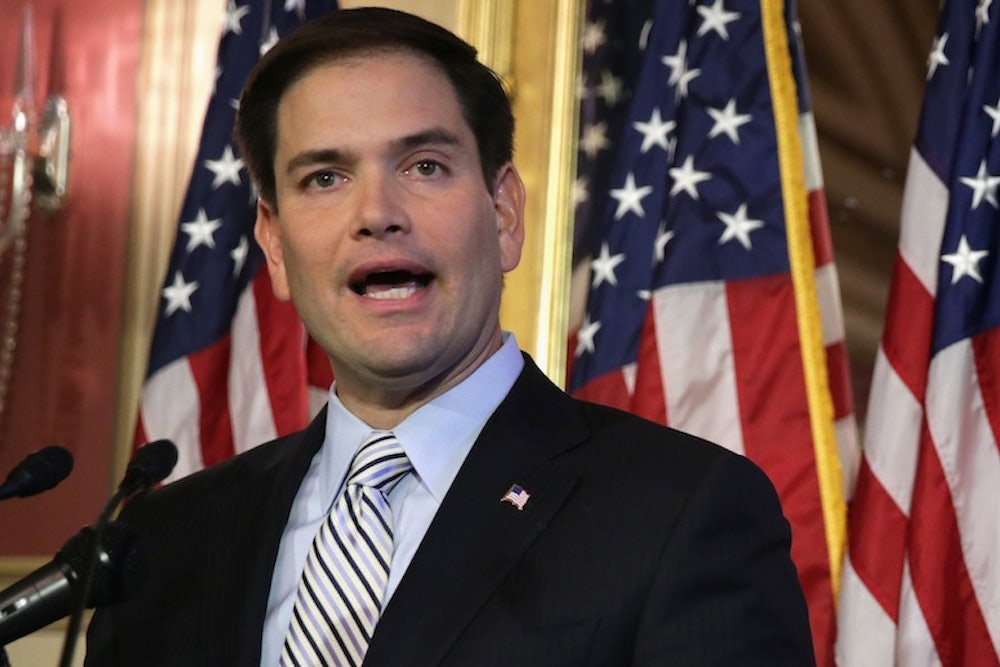Marco Rubio on Wednesday gave a speech about fighting poverty. Good for him and good for the party he represents. Republicans these days tend to ignore poverty altogether or to blame it on the poor themselves. Rubio, the Senator from Florida with well-known presidential aspirations, took a different approach on Wednesday. He talked about the persistence of poverty as a crisis. And he made some policy proposals along the way.
That doesn’t mean they were good proposals. One would create a “federal wage enhancement” subsidy. The idea would be to make low-paying jobs more lucrative, so that people who have those jobs didn't struggle quite so much. If that sounds a lot like an existing program, the Earned Income Tax Credit, that’s because it is. Rubio sees the federal wage enhancement as a replacement for the EITC. The details on his proposal aren’t clear—he hasn’t written legislation or put out background material yet—but the goal would be to create a program in which childless adults get the same benefits as those with families. That’s not the case with EITC today.
In principle, the idea makes sense. One downside of existing anti-poverty programs is that, by trying so hard to help kids, they leave out people who don’t have any. But if you tinker with the existing EITC formula, so that childless adults get more money, families with children are bound to get less. “There is simply no way around the math,” says Sharon Parrott, from the Center on Budget and Policy Priorities. “Virtually all the dollars in EITC right now go to families with kids. If you take the same pot of money and give larger benefits to adults without kids, then you have to take significant resources away from low-income families with kids.”
The one way to avoid this would be to pump more money into the program overall. And if that’s what Rubio has in mind, he’ll doubtless find plenty of support across the aisle. But Alex Conant, Rubio’s press secretary, confirmed to me via e-mail that Rubio wants his proposal to be budget neutral. If so, extra dollars for the tax credit will be hard to find—which means kids would probably suffer, even if childless adults were better off.
Rubio’s other major proposal—again, going mostly by the speech itself—is to transform existing federal anti-poverty programs into one giant fund that Washington would turn over to the states, so that they can spend and manage it as they see fit. The theory is that states know a lot more about the needs of their constituents than the federal government does—and that, left to their own devices, they could develop more innovative approaches. As proof, Rubio cited a handful of programs that tied unemployment benefits to job training.
Again, that may sound familiar. States already have a lot of leeway over how to implement everything from housing assistance to Medicaid. Republicans (and, yes, some Democrats) keep pushing for more, sometimes calling it “devolution” and in some cases proposing to transform federal programs into “block grants.” Typically these schemes set funding at pre-determined levels, rather than allow programs to grow automatically in order to accommodate the extra demand during hard times. That tends to keep program costs down, but it also means people who need the help frequently don't get it. During the most recent recession, something along those lines happened to Temporary Aid to Needy Families, the program that replaced the old welfare system.
Here’s where Rubio’s proposal gets a little more interesting. “We’re still working out the details,” Conant told me, “but the assumption is that it would increase/decrease to reflect actual need.” Conant also pointed me to Oren Cass, who was domestic policy director for the Mitt Romney campaign. Cass outlined a similar program in an article for National Review. In Cass's vision of a so-called “Flex Fund,” the “funding formula would be pegged to the size of the population in need and would grow at the same rate as the poverty threshold itself.” Rubio's program might not be identical, but apparently it would work in a similar way.
Does that mean Rubio’s plan would be responsive in a way that TANF and traditional block grants aren’t? Absent a lot more detail, I’m skeptical. The easiest, surest way to make sure a program provides help for everybody who needs it is to set eligibility guidelines and then provides benefits for everybody who meets them—in other words, to create an entitlement. Meanwhile, for all the criticism these programs sustain, the biggest, most important ones work rather well. Food stamps is probably the best example. The Supplemental Nutrition Assistance Program, as it's now known, keeps lots of people out of poverty, is prone to very little fraud, and operates with extremely low overhead. It boosts the economy, right when the economy needs boosting. It's pretty much a model program.
Still, this is an argument over how to design an anti-poverty agenda, rather than whether to have an anti-poverty agenda. That’s refreshing. And if Rubio truly sees his proposal as budget neutral—not adding money, but not taking it away, either—that’s better than seeking deep cuts in programs for the poor, as Paul Ryan and most Republicans have proposed.
There are plenty of reasons to be cynical about Rubio’s motives. And who knows what his actual legislation will include when, and if, he ever introduces it. But on Wednesday, Rubio engaged in a conversation Republicans have shunned for too long. That's progress.
